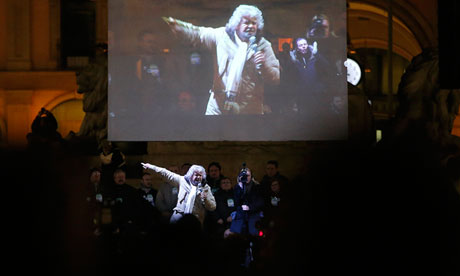
Beppe Grillo on the campaign trail. The diseases Berlusconi helped create in the 80s have continued to dominate the political scene. Photograph: Tony Gentile/Reuters
In 1994 Silvio Berlusconi was standing in his first election. Nobody gave him a hope in hell of winning. He was a laughing stock, promising to create a million jobs and defeat the communists and sweep away the old politics. Italy had just gone through a traumatic and to some extent cathartic corruption crisis that had ended up with hundreds of politicians behind bars. I was living in Milan at the time, and my son had just been born. It felt like a revolution. It even looked a little like a revolution. A new Italy was emerging, at last.
But then Berlusconi won. It was one of the most extraordinary political events of the 20th century. Even the workers of Turin voted for him. It turned into a nightmare. It won't last, everyone said. Italians will see through this plastic billionaire. The scandals will bring him down. The magistrates will sort him out. Berlusconi in government, it was said, would "vaccinate" Italians against him. Numerous other scandals, arrests, investigations and trials followed.
At first the prophets and pundits were proved right. Berlusconi was brought down by scandals and by the trade unions. But he did not go away. Italians were not vaccinated against him. The diseases he had helped to create in the 1980s – populism, individualism, short-termism – continued to dominate the political scene. More elections followed: 1996, 2001, 2006, 2008. In every single campaign, Berlusconi made himself the centre of attention. He was the issue. He was the reason for voting for or against something. He was the election. Even when he lost (only in 1996 and 2006) it was not by much, and his opponents were paralysed by their own lack of unity and principles. Meanwhile, Berlusconi allied himself with a series of regionalists, racists and fascists, many of whom were elected to important positions of power. Women in Italian politics were reduced to the whims of a patriarch who saw them as sex objects or playthings. It was horrific, and the damage it has done is immense. Berlusconi was no longer a laughing stock: it was the whole of Italy that appeared to be a sick joke. The Italian language itself took a horrible beating, as political debate turned into something akin to two drunks shouting at each other in a bar. Oratory became a thing of the distant past. Footballing terms became endemic.
Now we are in 2013. It has been 19 years since that first, hideous, hands-over-the-eyes election campaign. We have had more trials, more scandals, more endemic corruption: bunga bunga, accounting fraud, tax evasion. Yet Berlusconi is still there, and he has done it again. The campaign has been all about him: his gaffes (carefully calculated to capture media attention) and his promises (which have become more and more absurd – we are now up to 4m jobs, and taxation will be handed back to those who paid it out). Other populists took the stage in Berlusconi's shadow, hoping to emulate his successful campaigning tactics: Umberto Bossi from the Northern League, and even one of the magistrates behind the tangentopoli corruption investigations, Antonio Di Pietro. All fell by the wayside. Silvio, in the end, could out-populist everyone. In the meantime, in power, he managed only to look after his own private interests. Not one structural reform of note was passed by any Berlusconi government, although they did make savage cuts to public spending.
This time, however, Berlusconi has a true rival in the populist stakes.Beppe Grillo, comedian turned messianic political activist, has been filling piazzas all over Italy with his tirades against the political class, which he promises to sweep away and out of power. Grillo is a little like a mirror image of Berlusconi: a populist demagogue who, nonetheless, refuses to appear on TV and exalts the democratic power of the internet. His followers indulge in violent language and criticise all newspapers as "publicly funded" and part of the system.
Grillo's "programme" is almost entirely negative: he promises simply to remove all laws that have created a costly and corrupt political caste with vast privileges entrenched in an absurdly undemocratic electoral law. This is not a programme for government, it is a programme for anti-government. Grillo and Berlusconi are sworn enemies, in theory, but in practice they are two sides of the same coin: Grillosconi. This election could well be Berlusconi's last as a potential leader. But his influence will live on, and on, and on. The Berlusconi era will not end with the departure of Silvio himself.
This year my son will be voting in a national election for the first time. The "choice" on the left is a depressing one: a mish-mash of a coalition led by a functionary who could well end up simply supporting a "new" Monti government to satisfy the austerity demands from Berlin and Brussels. Twenty years of nihilistic and narcissistic populism have produced a self-obsessed system incapable of action. One day, perhaps, this nightmare will end. For the moment, I am still stuck in a silent scream.
Nessun commento:
Posta un commento